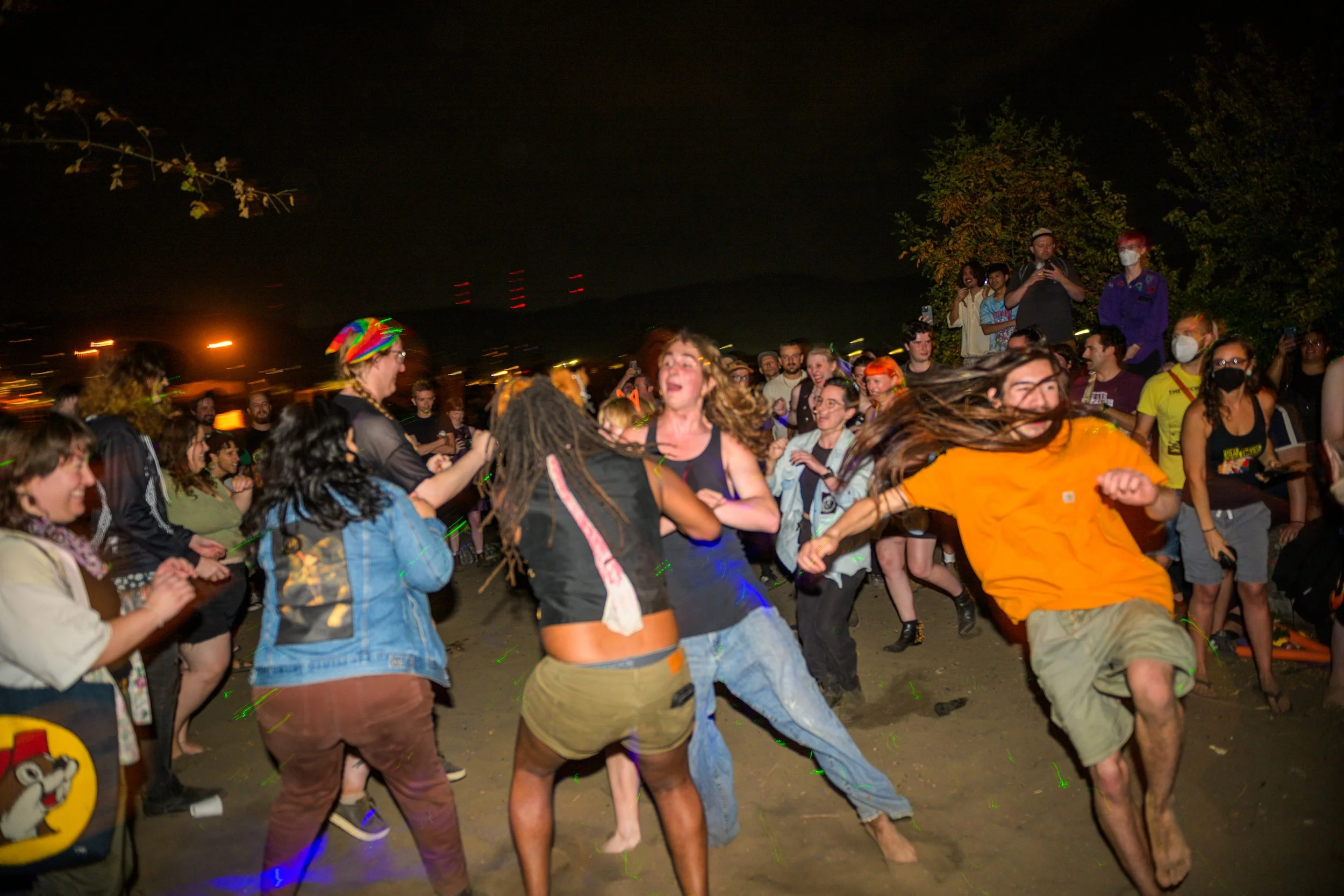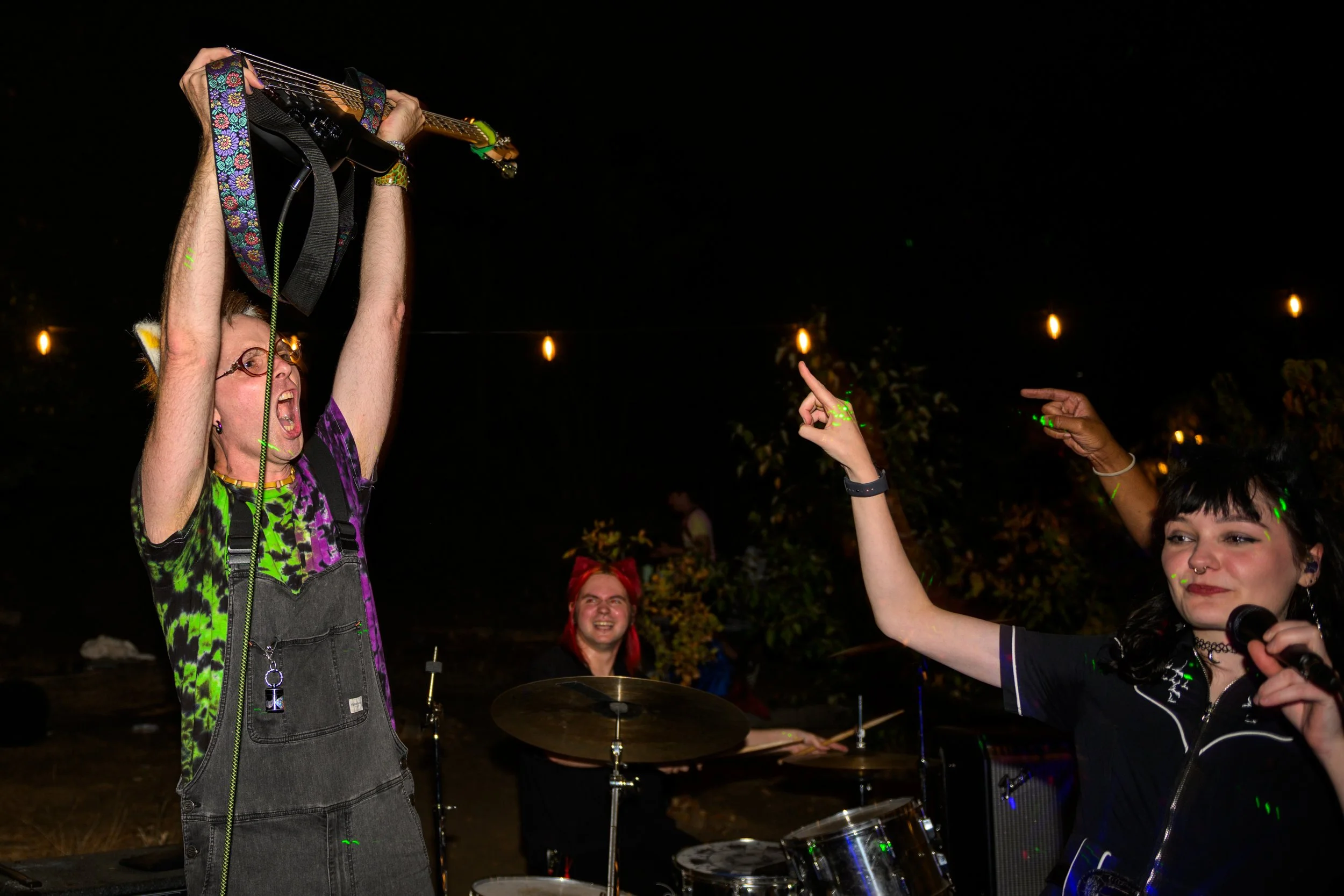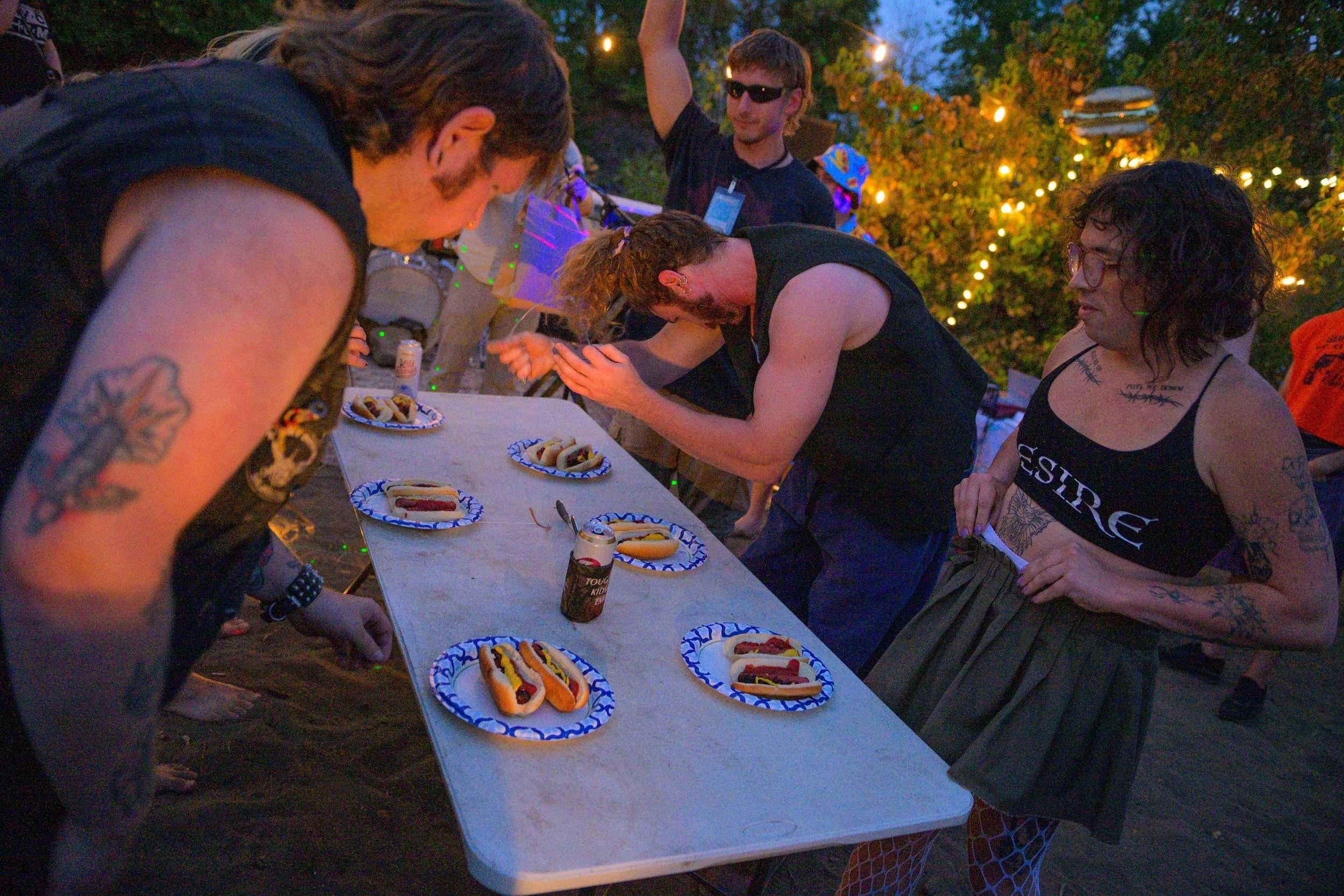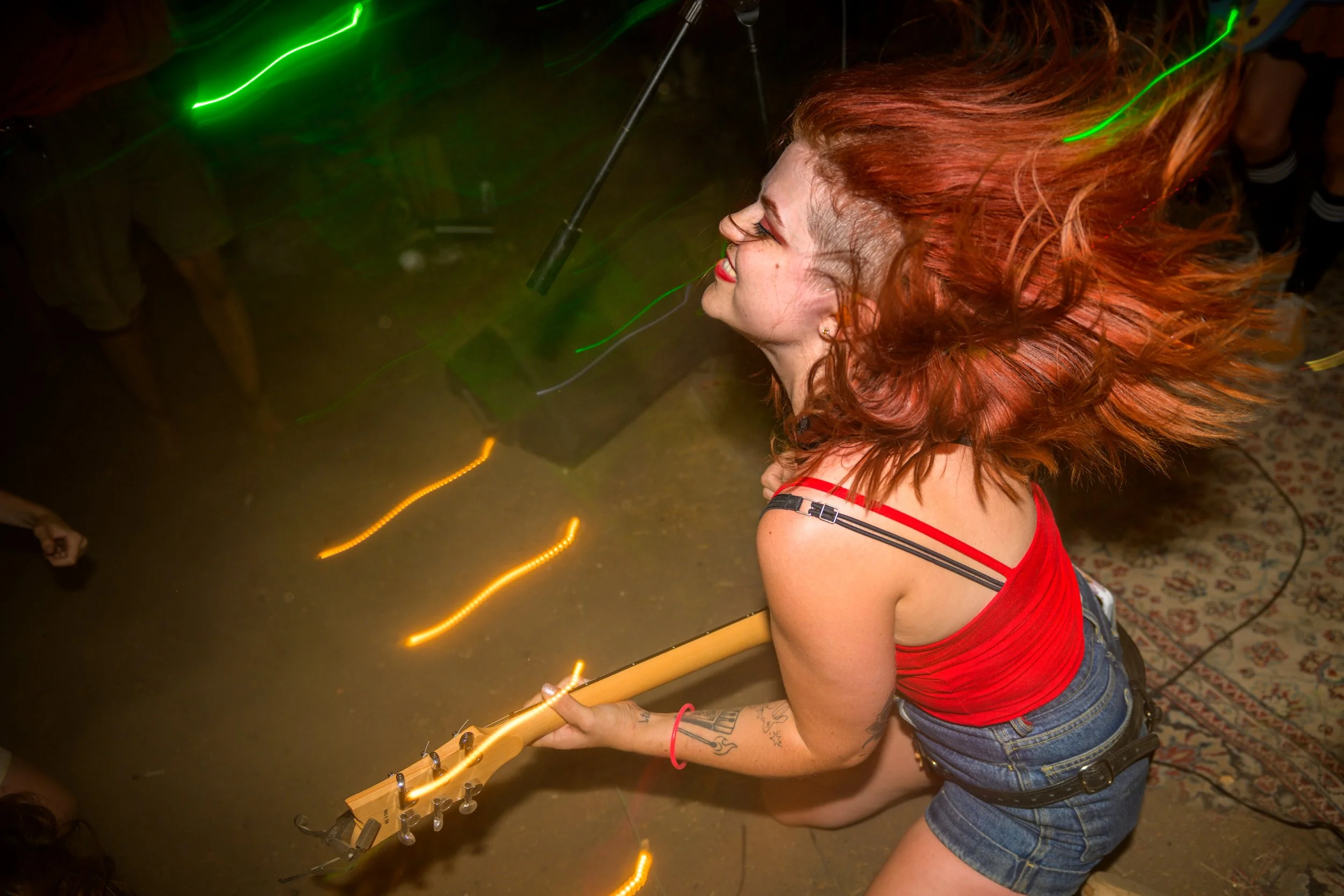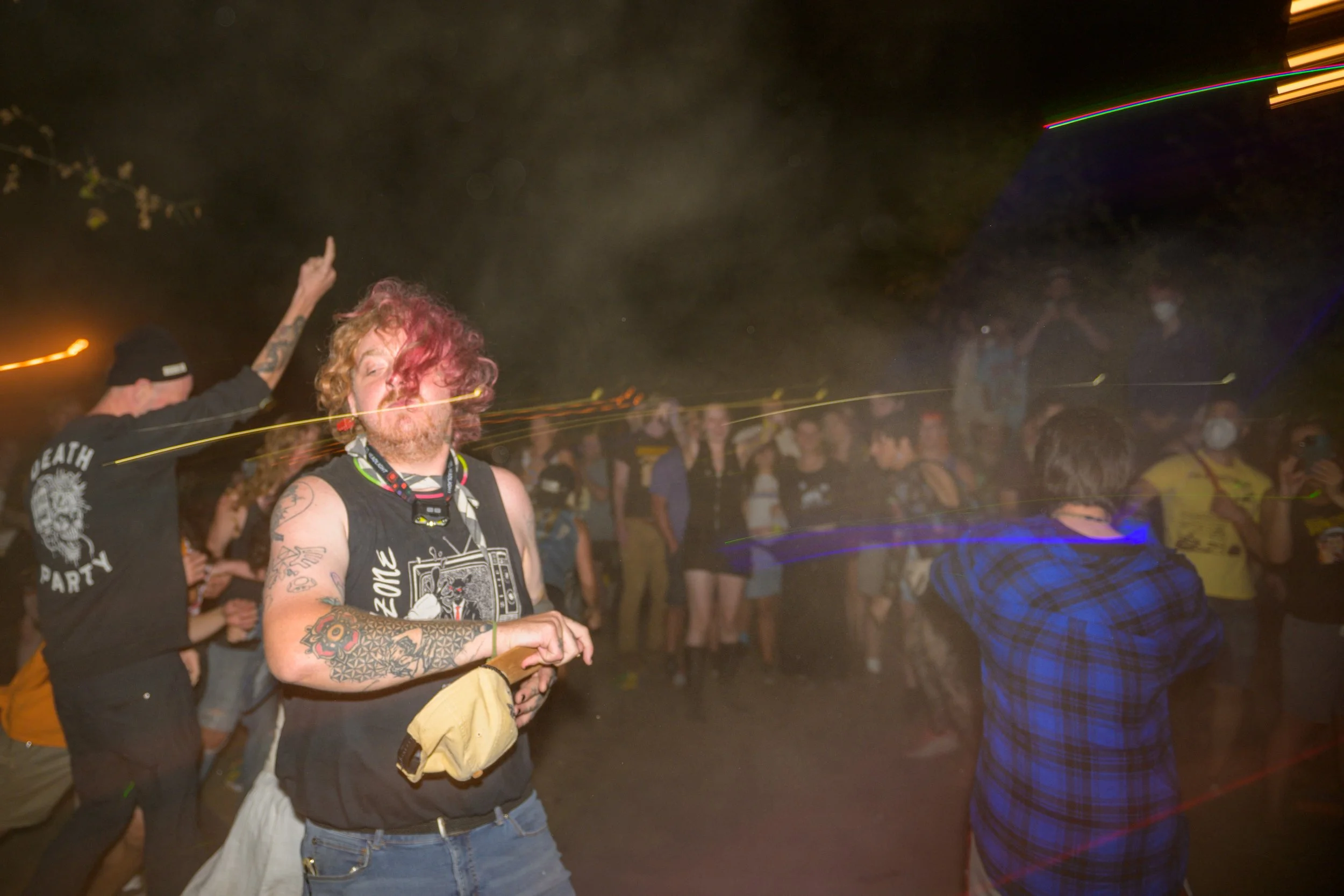The Holy Glizzy Gospels of Anarchy Beach
How hot dogs, concerts, community, and family-friendly mosh pits withstand an increasingly mad world
Is this the “Family friendly moshing” they speak of? Yes. Yes it is.
You don't find Anarchy Beach by accident. It's not on any tourist map, and the GPS will lead you into a goddamn cul-de-sac of industrial despair on Swan Island, surrounded by warehouses that groan with the secret labors of a city at work. To get there, you need faith. You need to follow the distant thump of a kick drum, the rumors whispered in a dive bar, the hand-scrawled address sharpied on the back of a flyer. Or if you know the right people, you need to at least see the Instagram post about it. But either way, you have to be looking for it.
And on this sweltering Saturday, hundreds of us were looking for it. We came for Glizzathon 2025.
Let's pause here to consider the name. Glizzathon. A marathon of "glizzies," the debased, glorious slang for the humble hot dog. In any other city, this would be a marketing gimmick for a minor league baseball team. In Portland, it is the organizing principle for a full-blown, unsanctioned music festival, a sacred rite of summer held on a dusty patch of forgotten riverfront. This is the genius of this town: the ability to take something profoundly stupid and treat it with the solemnity and joyous energy of a high religious ceremony. The hot dog was not just food; it was the Eucharist.
The scene--after I half-tripped down the final dirt path--was a masterpiece of beautiful, functional chaos. A single, sputtering generator provided the lifeblood, powering a PA system that looked like it had survived several minor wars and a long string of outdoor lights that would, in a few hours, provide the only illumination against the coming night. There was a tent setup over the stage, and the hotdog stand. The security was a shared understanding that nobody here was an asshole. This wasn't just DIY; this was a functioning micro-civilization built on loud music and processed meat tubes.
Believe it or not, there’s a stage, a generator, a hot dog stand, and some of the most talented bands in Portland mixed into this quagmire.
And the congregation... my god, the congregation. It was the whole damn city, a perfect cross-section of every tribe and phylum that calls this strange place home. There were the old-guard punks, leathery and tattooed, their faded Black Flag shirts stretched tight over dad-bods, standing next to teenagers in immaculate thrift-store finds who were probably conceived during a Dead Moon show. Toddlers with oversized, noise-canceling headphones bobbed on their parents' shoulders while a cluster of gray-haired hippies, looking like they'd taken a wrong turn on their way to the Country Fair in '78, nodded along contentedly. It was a beautiful, sprawling mess of humanity, a temporary autonomous zone where the only price of admission was a willingness to be part of the experiment.
Temple Grandin in all their hot, sweaty, country-western glory.
The first band I caught was Temple Grandin. The name alone is a piece of art--a reference to the autistic professor and animal behaviorist that is both deeply weird and, once you hear them, strangely fitting. This was no squall of feedback or confrontational racket. Instead, what poured from the makeshift stage was a sound as dusty and honest as the ground we stood on. It was country-rock in its purest form--not the slick, polished Nashville garbage you hear in a dentist's office, but the high lonesome sound of a pedal steel guitar crying over a muscular, country-swing heartbeat. The songs were stories, little three-minute novels about the long, dark highways of the soul. The singer delivered these truths with a kind of raw, weary conviction, his voice cracking in all the right places, and the crowd, even those just settling their blankets, were drawn right into the narrative. This wasn't background music; it was a beautiful, unflinching sermon that demanded your full attention.
Someone give this bassist a job. Apparently this was Culture Cat’s last show. So. Hire them if you would.
Then, a shift in the sonic weather. A band called Culture Cat took the makeshift stage, and the vibe immediately changed. Theirs was a cleaner, more melodic indie sound, laced with a kind of wistful energy that felt perfectly suited to the late afternoon sun slanting across the river. The guitars chimed, the basslines were clever and propulsive, and the songs were tight, smart, and full of hooks. A few couples started to dance, a slow, dusty shuffle near the stage. It was a moment of pure, uncut Portland sweetness, a reminder that underneath the noise and the irony, this city has a deep, romantic heart.
But this was Glizzathon. And the time had come for the high holy sacrament.
The hot dog eating contest was announced with the gravity of a papal address. A dozen or so contestants, a motley crew of the brave and the foolish, lined up at a folding table. There were skinny punks who looked like they hadn't eaten a real meal in weeks and burly, bearded men who looked like this was their personal Olympics. The rules were simple: eat as many glizzies as you can in five minutes. The crowd surged forward, a mass of howling, cheering degenerates, hungry for a spectacle of pure, American excess.
It was a nightmare. A beautiful, horrifying ballet of gastronomic carnage. Buns were dunked in water, meat was inhaled, and a fine spray of chewed-up nitrates rained down upon the front row. A man with a handlebar mustache, his face a grim mask of determination, established an early lead, his technique a blur of relentless motion. But he was challenged by a surprisingly fierce young woman with pinkish-purple hair who seemed to be able to unhinge her jaw like a python. The crowd roared with every downed dog. We were not just spectators; we were enablers, priests in this temple of competitive gluttony, screaming for more, more, more. When the final horn blew, the man with the mustache was declared the victor, a sweaty, bloated king. He raised a triumphant, greasy fist to the sky, and we roared our approval. It was disgusting. It was transcendent.
Mac from New Here very nearly hitting me in the testicles with their guitar. It’s fine, we’re all fine.
As the sun began to dip below the hills and far off industrial skeletons across the Willamette, a band called New Here plugged in. They describe themselves as a "Queer and Sincere pop-punk band," and they were every bit as joyous and vital as that sounds. This was pure, unadulterated energy. The songs were fast, catchy, and filled with a kind of defiant, heart-on-your-sleeve honesty that was impossible to resist. With the occasional hotdog related falatio joke sprinkled in. The whole vibe shifted from passive listening to active participation. A proper pit opened up, a swirling, friendly vortex of bodies bouncing off each other in the fading light. The sincerity was key; there wasn't a shred of cynicism in their performance. It was a pure celebration, and it felt like the perfect antidote to the competitive horror of the eating contest.
By the time the last band finished, the sky was a deep, bruised purple, and the string lights cast a warm, magical glow over the dusty beach. The generator hummed a steady, reassuring rhythm. People were sprawled on blankets, sharing the last of their beers, talking, laughing. The tribes were all mixed up now--the punks and the hippies and the parents and the kids, all just faces in the gentle, artificial twilight.
There’s nothing better than moshing after eating hot dogs.
I stood back and watched the scene, the flickering lights, the silhouettes of people against the dark, shimmering water. This, I thought, is the real thing. This is the Portland that doesn't make it into the travel magazines or the goddamn TV shows. It's not about the curated weirdness or the artisanal everything. It's about this: a bunch of people deciding to build their own church for a day on a forgotten patch of dirt, powered by a generator and united by a shared love for loud music and cheap, stupid food. It's about the radical, beautiful, and profoundly hopeful act of creating your own magic, just because you can. And as I walked back toward the distant glow of the city, my ears ringing and my soul strangely full, I knew I had just witnessed the heart of this weird, magnificent city, beating loud and clear in the anarchic dark.

